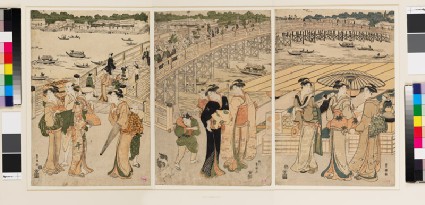Browse: 772 objects
- Reference URL
Actions
Ryōgoku bridge with figures in the foreground
-
Details
- Associated place
- Date
- late 18th century - early 19th century
- Artist/maker
-
Utagawa Toyokuni (1769 - 1825) (designer)
- Associated people
-
Nishimuraya Yohachi (c. 1751 - c. 1870) (publisher)
- Material and technique
- nishiki-e (multi-block) woodblock print, printed with water-based vegetable pigments
- Dimensions
- sheet 37.1 x 77.3 cm max. (height x width)
- Material index
- Technique index
- Object type index
- No. of items
- 3
- Credit line
- Presented by Mrs Allan and Mr and Mrs H. N. Spalding, 1952.
- Accession no.
- EAX.4151
-
Further reading
Oxford: Ashmolean Museum, 24 August-30 November 2005, Beauties of the Four Seasons, Mitsuko Watanabe, ed. (Oxford: Ashmolean Museum, 2005), no. 28 on p. 60, illus. pp. 60-61
Glossary (2)
nishiki-e, vegetable pigments
-
nishiki-e
Nishiki-e literally means 'brocade pictures' and refers to multi-coloured woodblock prints.
-
vegetable pigments
Vegetable pigments were used to create coloured dyes for Japanese prints, paintings, and textiles. These pigments often faded over time due to the chemical reactions they underwent.
Location
-
- currently in research collection
Objects are sometimes moved to a different location. Our object location data is usually updated on a monthly basis. Contact the Jameel Study Centre if you are planning to visit the museum to see a particular object on display, or would like to arrange an appointment to see an object in our reserve collections.
Publications online
-

Beauties of the Four Seasons
The Ryōgoku bridge in Edo was a place well-known for its firework displays. The many tea shops around it made for a lively atmosphere. In the foreground, women are busily attending to their own activities. One woman is holding a parasol while the centre print shows two women and two children looking at two dogs playing. One of the women on the left print is holding a fan and wearing an agebōshi (white hood worn by members of high society when going out). Groups of people are walking across the bridge, including a high ranking samurai riding a horse, wearing a straw hat, and escorted by further samurai. In the background, boats are floating by in what is thought to be a hot summer’s day.
© 2013 University of Oxford - Ashmolean Museum




